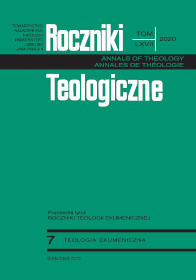„On to dla nas grzechem uczynił tego, który nie znał grzechu” (2 Kor 5,21a): Rozumienie Pawłowej wypowiedzi w historii egzegezy
Abstrakt
Autor artykułu szuka odpowiedzi na pytanie, jak w historii egzegezy interpretowano wypowiedź Apostoła Pawła z 2 Kor 5,21a o tym, że Bóg uczynił Chrystusa grzechem. Artykuł składa się z kilku części uszeregowanych chronologicznie. Najpierw przedstawiona została interpretacja 2 Kor 5,21a przez teologów epoki patrystycznej (zwłaszcza Orygenesa, Cyryla Aleksandryjskiego, Grzegorza z Nazjanzu, Grzegorza z Nyssy, Jana Chryzostoma, Augustyna z Hippony). Następnie omówiono teologów średniowiecznych na czele z Anzelmem z Canterbury. Trzecim etapem było zwrócenie uwagi na Marcina Lutra, Jana Kalwina oraz innych teologów czasu Reformacji. Ostatni punkt stanowi ukazanie interpretacji 2 Kor 5,21a przez teologów nowożytnych. Zauważono, że egzegeci epoki nowożytnej w swoich badaniach nawiązują do owoców pracy teologów wcześniej żyjących. W interpretacji 2 Kor 5,21a wyróżnić można trzy najważniejsze tendencje, które widzą tutaj odniesienie do wcielenia Syna Bożego, do Jego śmierci rozumianej jako ofiara za grzech i do szeroko rozumianej rzeczywistości grzechu, z którą zmierzył się Jezus Chrystus.
Bibliografia
Aletti Jean-Noël: „God made Christ to be Sin” (2 Corinthians 5:21): Reflections on a Pauline Paradox, w: The Redemption. An Interdisciplinary Symposium on Christ as Redeemer, red. Stephen T. Davis, Daniel Kendall, Gerald O’Collins, Oxford: Oxford University Press 2004, s. 101-120.
Bachmann Philipp: Der zweite Brief des Paulus an die Korinther (KNT 8), Leipzig: A. Deichert 1922.
Barrett Charles K.: The Second Epistle to the Corinthians, London: Continuum 1973.
Bell Richard H.: Sacrifice and Christology in Paul, „The Journal of Theological Studies” 53 (2002), s. 1-27.
Bieringer Reimund: Sünde und Gerechtigkeit Gottes in Korinther 5,21, w: Reimund Bieringer, Jan Lambrecht, Studies on 2 Corinthians, (BETL 112), Leuven: Leuven University Press 1994, s. 461-513.
Bird Michael F.: Incorporated Righteousness: A Response to Recent Evangelical Discussion concerning the Imputation of Christ’s Righteousness in Justification, „Journal of the Evangelical Theological Society” 47 (2004), no. 2, s. 253-275.
Branick Vincent P.: The Sinful Flesh of the Son of God (Rom 8:3): A Key Image of Pauline Theology, „Catholic Biblical Quarterly” 47 (1985), s. 246-262.
Breytenbach Cilliers: Versöhnung, Stellvertretung und Sühne. Semantische und traditionsgeschichtliche Bemerkungen am Beispiel der paulinischen Briefe, „New Testament Studies“ 39 (1993), s. 59-79.
Collins Raymond F.: Second Corinthians, (PCNT), Grand Rapids, MI: Baker Academic 2013.
Garland David E.: 2 Corinthians, (NAC 29), Nashville: Broadman & Holman Publishers 1999.
Harris Murray J.: The Second Epistle to the Corinthians: a Commentary on the Greek Text, (NIGTC), Grand Rapids, MI: W.B. Eerdmans 2005.
Heinrici Carl Friedrich Georg: Das zweite Sendschreiben des Apostels Paulus an die Korinther, Berlin: W. Hertz 1887.
Hofius Otfried: Paulusstudien, (WUNT 51), Tübingen: Mohr Siebeck 19942.
Hooker Morna D.: Interchange in Christ, „Journal of Theological Studies” 22(1971), s. 349-361.
Kowalski Marcin: Rola słowa Bożego w procesie pojednania człowieka z Bogiem w świetle 2 Kor 5,16-21, w: Moc słowa Pańskiego. Adhortacja apostolska „Verbum Domini” w refleksji biblijno-teologicznej, (ABL 8), red. Bogusław Migut, Andrzej Piwowar, Lublin: Wydawnictwo KUL 2012, s. 79-100.
Kręcidło Janusz: Dlaczego Bóg uczynił Chrystusa grzechem (2 Kor 5,21)?, „Ruch Biblijny i Liturgiczny” 60 (2007), nr 4, s. 273-286.
Kruse Colin G.: 2 Corinthians: An Introduction and Commentary, (TNTC 8), Nottingham: Inver-Varsity Press 2015.
Matera Frank J.: II Corinthians: A Commentary, (NTL), Louisville, KY: Westminster John Knox Press 2013.
McLean Bradley H.: The Cursed Christ. Mediterranean Expulsion Rituals and Pauline Soteriology, (LNTS 126), Sheffield: Sheffield Academic Press 1996.
Minor Mitzi L.: 2 Corinthians, Macon, GA: Smyth & Helwys Publishing Inc 2009.
Morris Leon L.: The Cross in the New Testament, Grand Rapids, MI–Cambridge: W.B. Eerdmans 1965.
Plummer Alfred: A Critical and Exegetical Commentary on the Second Epistle of St. Paul to the Corinthians (ICC), New York: T & T Clark 1915.
Ritschl Albrecht: Die christliche Lehre von Rechtfertigung und Versöhnung, t. 2: Der biblische Stoff der Lehre, Bonn: A. Markus 1889.
Sabourin Léopold: Christ made „sin” (2 Cor 5:21): Sacrifice and Redemption in the History of a Formula, w: Stanislas Lyonnet, Léopold Sabourin, Sin, Redemption and Sacrifice. A Biblical and Patristic Study, (AnBib 48), Roma: Biblical Institute Press 1970, s. 187-286.
Sabourin Léopold: Note sur 2 Cor. 5,21, Le Christ fait péché, „Sciences ecclésiastiques” 11 (1959), s. 419-424.
Stuhlmacher Peter: Gerechtigkeit Gottes bei Paulus, (FRLANT 87), Göttingen: Vandenhoeck & Ruprecht 19662.
Thrall Margaret Eleanor: A Critical and Exegetical Commentary on the Second Epistle of the Corinthians (ICC), London–New York: T & T Clark International 2004.
Toney Carl N., Martin Ralph P.: 1-2 Corinthians (CBC 15), Carol Stream, IL: Tyndale House Publishers 2009.
Whiteley D.E.H.: St. Paul’s Thought on the Atonement, „The Journal of Theological Studies” 8(1957), s. 240-255.
Wilckens Ulrich: Der Brief an die Römer (EKK SonAus), Neukirchen-Vluyn: Neukirchener/ Patmos 2010.
Copyright (c) 2020 Roczniki Teologiczne

Utwór dostępny jest na licencji Creative Commons Uznanie autorstwa – Użycie niekomercyjne – Bez utworów zależnych 4.0 Międzynarodowe.





